Innovation and Entrepreneurship: Organic Food Restaurant Startup Idea
VerifiedAdded on 2023/06/18
|10
|3183
|284
Report
AI Summary
This report outlines a business plan for an organic food restaurant startup in London. The business aims to provide 100% organic and natural food products to health-conscious customers at affordable prices. The report covers the startup idea, industry profile, business model, point of differentiation, prospective customers, marketing plan (4Ps), competitor analysis (Apres Food, Kinda Co., Man in pasta), sources of funding, and intellectual property protection. The business intends to directly source fresh ingredients from farmers, establish a strong brand identity, and leverage technology for efficiency. Challenges such as competition and financial capacity are also addressed, with a focus on delivering quality, taste, and affordability to build customer trust and brand goodwill. Desklib provides access to similar business plans and solved assignments for students.
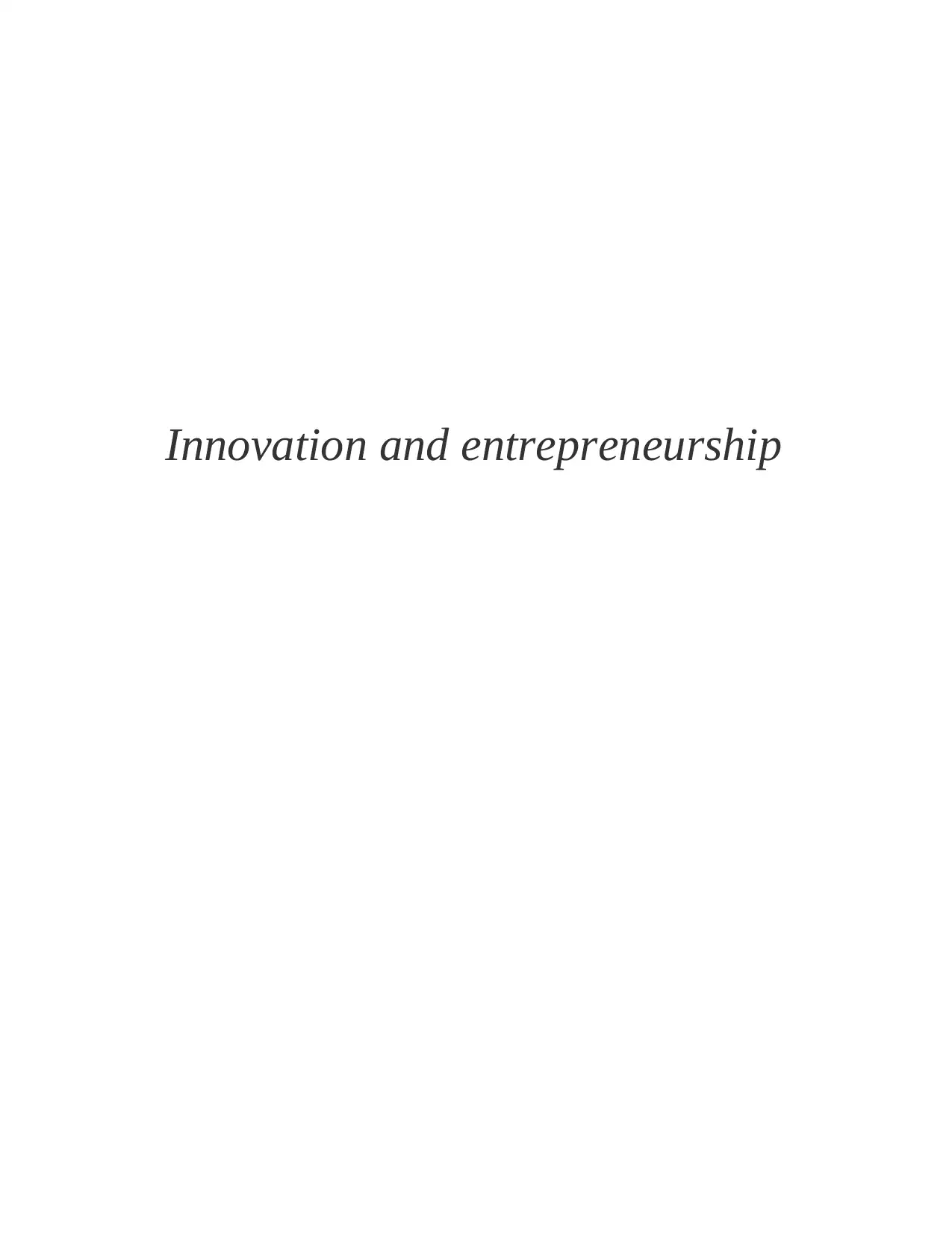
Innovation and entrepreneurship
Paraphrase This Document
Need a fresh take? Get an instant paraphrase of this document with our AI Paraphraser
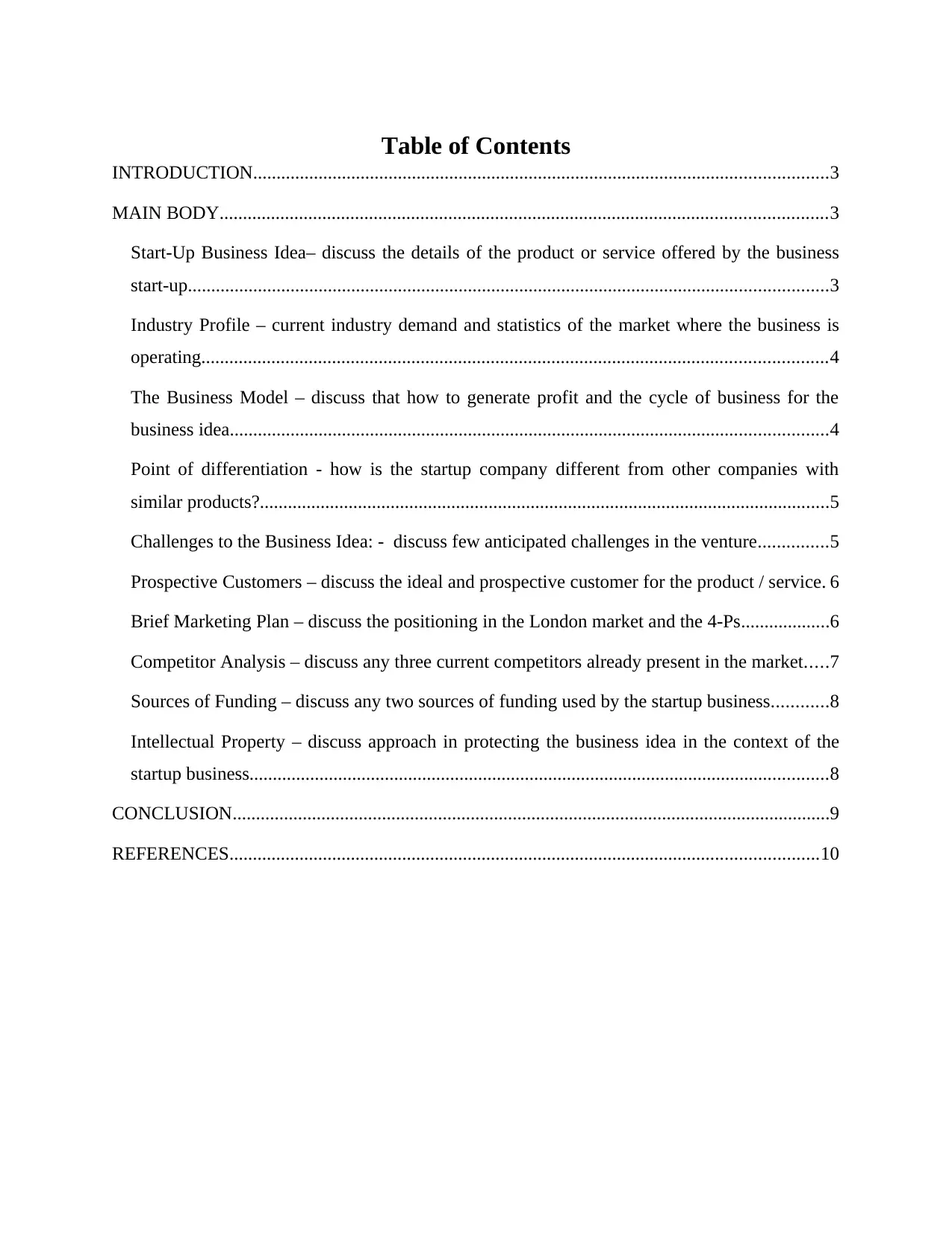
Table of Contents
INTRODUCTION...........................................................................................................................3
MAIN BODY..................................................................................................................................3
Start-Up Business Idea– discuss the details of the product or service offered by the business
start-up.........................................................................................................................................3
Industry Profile – current industry demand and statistics of the market where the business is
operating......................................................................................................................................4
The Business Model – discuss that how to generate profit and the cycle of business for the
business idea................................................................................................................................4
Point of differentiation - how is the startup company different from other companies with
similar products?..........................................................................................................................5
Challenges to the Business Idea: - discuss few anticipated challenges in the venture...............5
Prospective Customers – discuss the ideal and prospective customer for the product / service. 6
Brief Marketing Plan – discuss the positioning in the London market and the 4-Ps...................6
Competitor Analysis – discuss any three current competitors already present in the market.....7
Sources of Funding – discuss any two sources of funding used by the startup business............8
Intellectual Property – discuss approach in protecting the business idea in the context of the
startup business............................................................................................................................8
CONCLUSION................................................................................................................................9
REFERENCES..............................................................................................................................10
INTRODUCTION...........................................................................................................................3
MAIN BODY..................................................................................................................................3
Start-Up Business Idea– discuss the details of the product or service offered by the business
start-up.........................................................................................................................................3
Industry Profile – current industry demand and statistics of the market where the business is
operating......................................................................................................................................4
The Business Model – discuss that how to generate profit and the cycle of business for the
business idea................................................................................................................................4
Point of differentiation - how is the startup company different from other companies with
similar products?..........................................................................................................................5
Challenges to the Business Idea: - discuss few anticipated challenges in the venture...............5
Prospective Customers – discuss the ideal and prospective customer for the product / service. 6
Brief Marketing Plan – discuss the positioning in the London market and the 4-Ps...................6
Competitor Analysis – discuss any three current competitors already present in the market.....7
Sources of Funding – discuss any two sources of funding used by the startup business............8
Intellectual Property – discuss approach in protecting the business idea in the context of the
startup business............................................................................................................................8
CONCLUSION................................................................................................................................9
REFERENCES..............................................................................................................................10
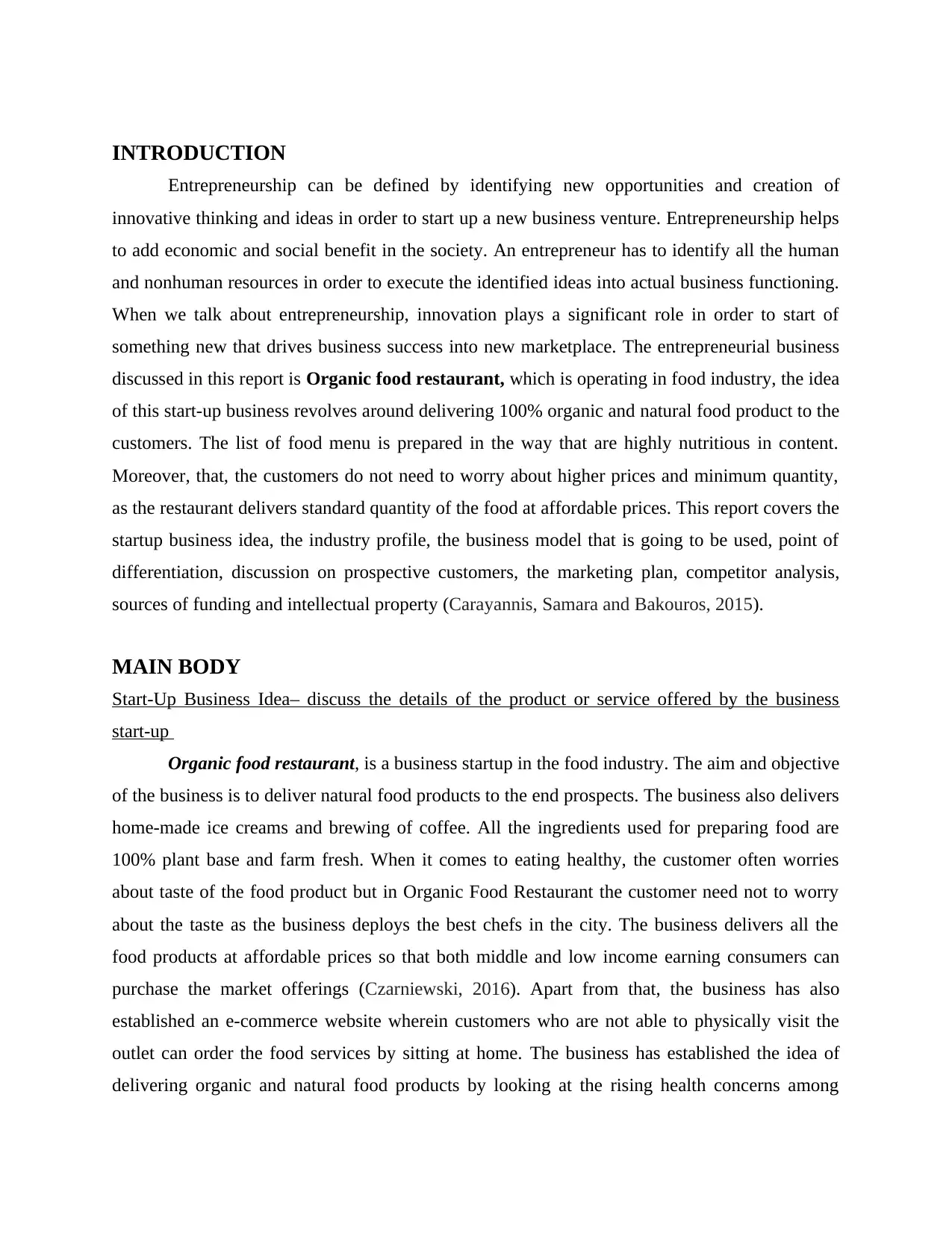
INTRODUCTION
Entrepreneurship can be defined by identifying new opportunities and creation of
innovative thinking and ideas in order to start up a new business venture. Entrepreneurship helps
to add economic and social benefit in the society. An entrepreneur has to identify all the human
and nonhuman resources in order to execute the identified ideas into actual business functioning.
When we talk about entrepreneurship, innovation plays a significant role in order to start of
something new that drives business success into new marketplace. The entrepreneurial business
discussed in this report is Organic food restaurant, which is operating in food industry, the idea
of this start-up business revolves around delivering 100% organic and natural food product to the
customers. The list of food menu is prepared in the way that are highly nutritious in content.
Moreover, that, the customers do not need to worry about higher prices and minimum quantity,
as the restaurant delivers standard quantity of the food at affordable prices. This report covers the
startup business idea, the industry profile, the business model that is going to be used, point of
differentiation, discussion on prospective customers, the marketing plan, competitor analysis,
sources of funding and intellectual property (Carayannis, Samara and Bakouros, 2015).
MAIN BODY
Start-Up Business Idea– discuss the details of the product or service offered by the business
start-up
Organic food restaurant, is a business startup in the food industry. The aim and objective
of the business is to deliver natural food products to the end prospects. The business also delivers
home-made ice creams and brewing of coffee. All the ingredients used for preparing food are
100% plant base and farm fresh. When it comes to eating healthy, the customer often worries
about taste of the food product but in Organic Food Restaurant the customer need not to worry
about the taste as the business deploys the best chefs in the city. The business delivers all the
food products at affordable prices so that both middle and low income earning consumers can
purchase the market offerings (Czarniewski, 2016). Apart from that, the business has also
established an e-commerce website wherein customers who are not able to physically visit the
outlet can order the food services by sitting at home. The business has established the idea of
delivering organic and natural food products by looking at the rising health concerns among
Entrepreneurship can be defined by identifying new opportunities and creation of
innovative thinking and ideas in order to start up a new business venture. Entrepreneurship helps
to add economic and social benefit in the society. An entrepreneur has to identify all the human
and nonhuman resources in order to execute the identified ideas into actual business functioning.
When we talk about entrepreneurship, innovation plays a significant role in order to start of
something new that drives business success into new marketplace. The entrepreneurial business
discussed in this report is Organic food restaurant, which is operating in food industry, the idea
of this start-up business revolves around delivering 100% organic and natural food product to the
customers. The list of food menu is prepared in the way that are highly nutritious in content.
Moreover, that, the customers do not need to worry about higher prices and minimum quantity,
as the restaurant delivers standard quantity of the food at affordable prices. This report covers the
startup business idea, the industry profile, the business model that is going to be used, point of
differentiation, discussion on prospective customers, the marketing plan, competitor analysis,
sources of funding and intellectual property (Carayannis, Samara and Bakouros, 2015).
MAIN BODY
Start-Up Business Idea– discuss the details of the product or service offered by the business
start-up
Organic food restaurant, is a business startup in the food industry. The aim and objective
of the business is to deliver natural food products to the end prospects. The business also delivers
home-made ice creams and brewing of coffee. All the ingredients used for preparing food are
100% plant base and farm fresh. When it comes to eating healthy, the customer often worries
about taste of the food product but in Organic Food Restaurant the customer need not to worry
about the taste as the business deploys the best chefs in the city. The business delivers all the
food products at affordable prices so that both middle and low income earning consumers can
purchase the market offerings (Czarniewski, 2016). Apart from that, the business has also
established an e-commerce website wherein customers who are not able to physically visit the
outlet can order the food services by sitting at home. The business has established the idea of
delivering organic and natural food products by looking at the rising health concerns among
⊘ This is a preview!⊘
Do you want full access?
Subscribe today to unlock all pages.

Trusted by 1+ million students worldwide
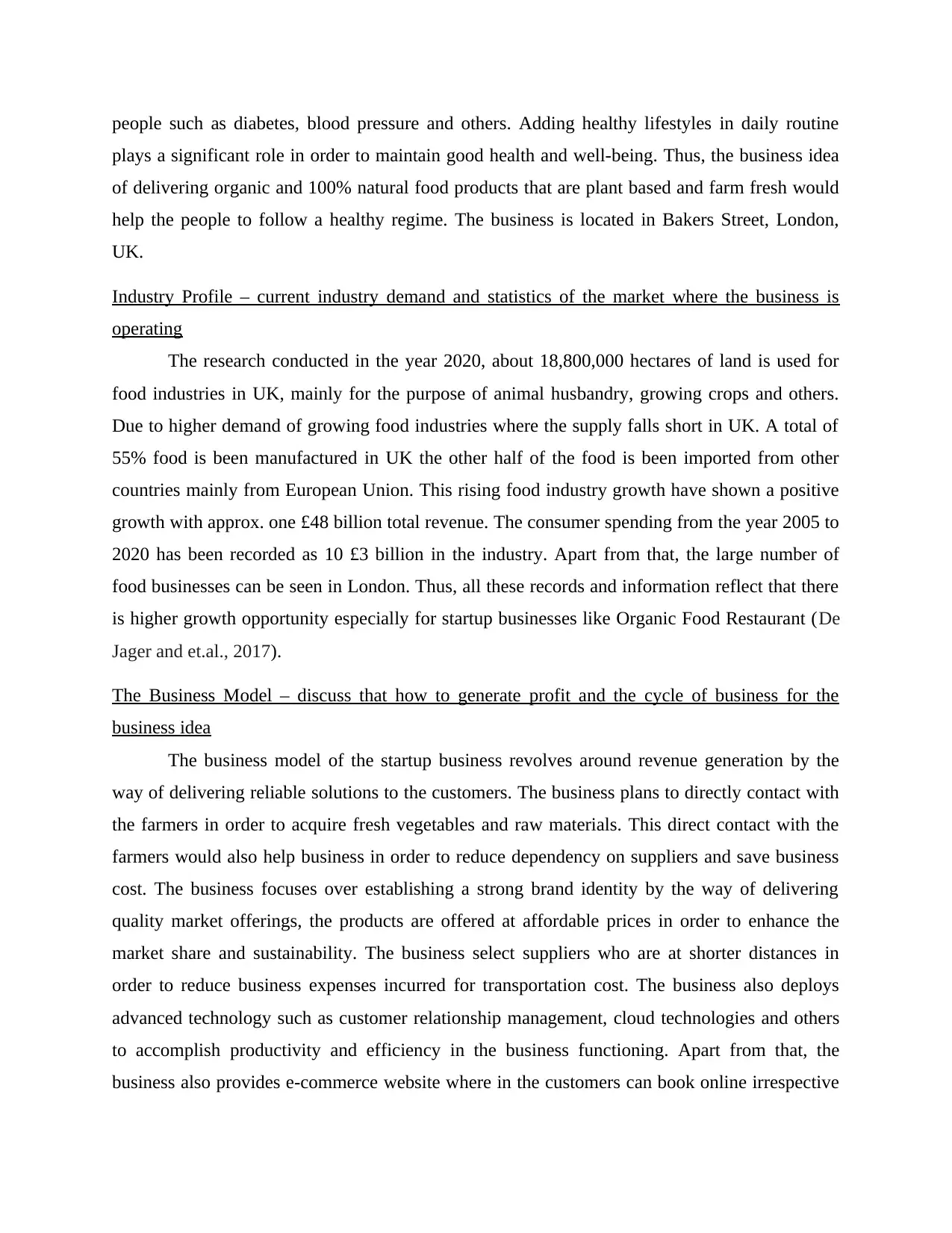
people such as diabetes, blood pressure and others. Adding healthy lifestyles in daily routine
plays a significant role in order to maintain good health and well-being. Thus, the business idea
of delivering organic and 100% natural food products that are plant based and farm fresh would
help the people to follow a healthy regime. The business is located in Bakers Street, London,
UK.
Industry Profile – current industry demand and statistics of the market where the business is
operating
The research conducted in the year 2020, about 18,800,000 hectares of land is used for
food industries in UK, mainly for the purpose of animal husbandry, growing crops and others.
Due to higher demand of growing food industries where the supply falls short in UK. A total of
55% food is been manufactured in UK the other half of the food is been imported from other
countries mainly from European Union. This rising food industry growth have shown a positive
growth with approx. one £48 billion total revenue. The consumer spending from the year 2005 to
2020 has been recorded as 10 £3 billion in the industry. Apart from that, the large number of
food businesses can be seen in London. Thus, all these records and information reflect that there
is higher growth opportunity especially for startup businesses like Organic Food Restaurant (De
Jager and et.al., 2017).
The Business Model – discuss that how to generate profit and the cycle of business for the
business idea
The business model of the startup business revolves around revenue generation by the
way of delivering reliable solutions to the customers. The business plans to directly contact with
the farmers in order to acquire fresh vegetables and raw materials. This direct contact with the
farmers would also help business in order to reduce dependency on suppliers and save business
cost. The business focuses over establishing a strong brand identity by the way of delivering
quality market offerings, the products are offered at affordable prices in order to enhance the
market share and sustainability. The business select suppliers who are at shorter distances in
order to reduce business expenses incurred for transportation cost. The business also deploys
advanced technology such as customer relationship management, cloud technologies and others
to accomplish productivity and efficiency in the business functioning. Apart from that, the
business also provides e-commerce website where in the customers can book online irrespective
plays a significant role in order to maintain good health and well-being. Thus, the business idea
of delivering organic and 100% natural food products that are plant based and farm fresh would
help the people to follow a healthy regime. The business is located in Bakers Street, London,
UK.
Industry Profile – current industry demand and statistics of the market where the business is
operating
The research conducted in the year 2020, about 18,800,000 hectares of land is used for
food industries in UK, mainly for the purpose of animal husbandry, growing crops and others.
Due to higher demand of growing food industries where the supply falls short in UK. A total of
55% food is been manufactured in UK the other half of the food is been imported from other
countries mainly from European Union. This rising food industry growth have shown a positive
growth with approx. one £48 billion total revenue. The consumer spending from the year 2005 to
2020 has been recorded as 10 £3 billion in the industry. Apart from that, the large number of
food businesses can be seen in London. Thus, all these records and information reflect that there
is higher growth opportunity especially for startup businesses like Organic Food Restaurant (De
Jager and et.al., 2017).
The Business Model – discuss that how to generate profit and the cycle of business for the
business idea
The business model of the startup business revolves around revenue generation by the
way of delivering reliable solutions to the customers. The business plans to directly contact with
the farmers in order to acquire fresh vegetables and raw materials. This direct contact with the
farmers would also help business in order to reduce dependency on suppliers and save business
cost. The business focuses over establishing a strong brand identity by the way of delivering
quality market offerings, the products are offered at affordable prices in order to enhance the
market share and sustainability. The business select suppliers who are at shorter distances in
order to reduce business expenses incurred for transportation cost. The business also deploys
advanced technology such as customer relationship management, cloud technologies and others
to accomplish productivity and efficiency in the business functioning. Apart from that, the
business also provides e-commerce website where in the customers can book online irrespective
Paraphrase This Document
Need a fresh take? Get an instant paraphrase of this document with our AI Paraphraser
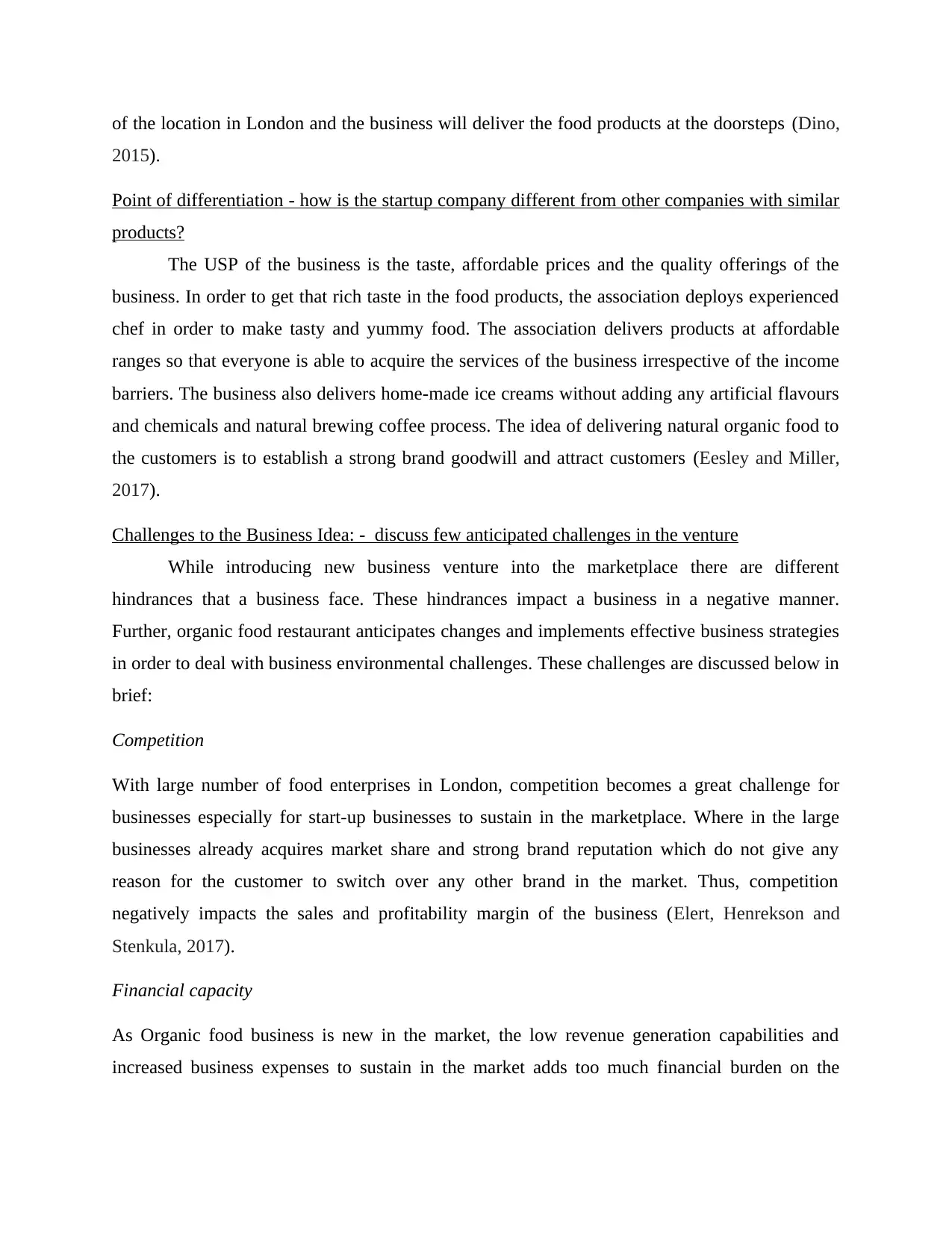
of the location in London and the business will deliver the food products at the doorsteps (Dino,
2015).
Point of differentiation - how is the startup company different from other companies with similar
products?
The USP of the business is the taste, affordable prices and the quality offerings of the
business. In order to get that rich taste in the food products, the association deploys experienced
chef in order to make tasty and yummy food. The association delivers products at affordable
ranges so that everyone is able to acquire the services of the business irrespective of the income
barriers. The business also delivers home-made ice creams without adding any artificial flavours
and chemicals and natural brewing coffee process. The idea of delivering natural organic food to
the customers is to establish a strong brand goodwill and attract customers (Eesley and Miller,
2017).
Challenges to the Business Idea: - discuss few anticipated challenges in the venture
While introducing new business venture into the marketplace there are different
hindrances that a business face. These hindrances impact a business in a negative manner.
Further, organic food restaurant anticipates changes and implements effective business strategies
in order to deal with business environmental challenges. These challenges are discussed below in
brief:
Competition
With large number of food enterprises in London, competition becomes a great challenge for
businesses especially for start-up businesses to sustain in the marketplace. Where in the large
businesses already acquires market share and strong brand reputation which do not give any
reason for the customer to switch over any other brand in the market. Thus, competition
negatively impacts the sales and profitability margin of the business (Elert, Henrekson and
Stenkula, 2017).
Financial capacity
As Organic food business is new in the market, the low revenue generation capabilities and
increased business expenses to sustain in the market adds too much financial burden on the
2015).
Point of differentiation - how is the startup company different from other companies with similar
products?
The USP of the business is the taste, affordable prices and the quality offerings of the
business. In order to get that rich taste in the food products, the association deploys experienced
chef in order to make tasty and yummy food. The association delivers products at affordable
ranges so that everyone is able to acquire the services of the business irrespective of the income
barriers. The business also delivers home-made ice creams without adding any artificial flavours
and chemicals and natural brewing coffee process. The idea of delivering natural organic food to
the customers is to establish a strong brand goodwill and attract customers (Eesley and Miller,
2017).
Challenges to the Business Idea: - discuss few anticipated challenges in the venture
While introducing new business venture into the marketplace there are different
hindrances that a business face. These hindrances impact a business in a negative manner.
Further, organic food restaurant anticipates changes and implements effective business strategies
in order to deal with business environmental challenges. These challenges are discussed below in
brief:
Competition
With large number of food enterprises in London, competition becomes a great challenge for
businesses especially for start-up businesses to sustain in the marketplace. Where in the large
businesses already acquires market share and strong brand reputation which do not give any
reason for the customer to switch over any other brand in the market. Thus, competition
negatively impacts the sales and profitability margin of the business (Elert, Henrekson and
Stenkula, 2017).
Financial capacity
As Organic food business is new in the market, the low revenue generation capabilities and
increased business expenses to sustain in the market adds too much financial burden on the
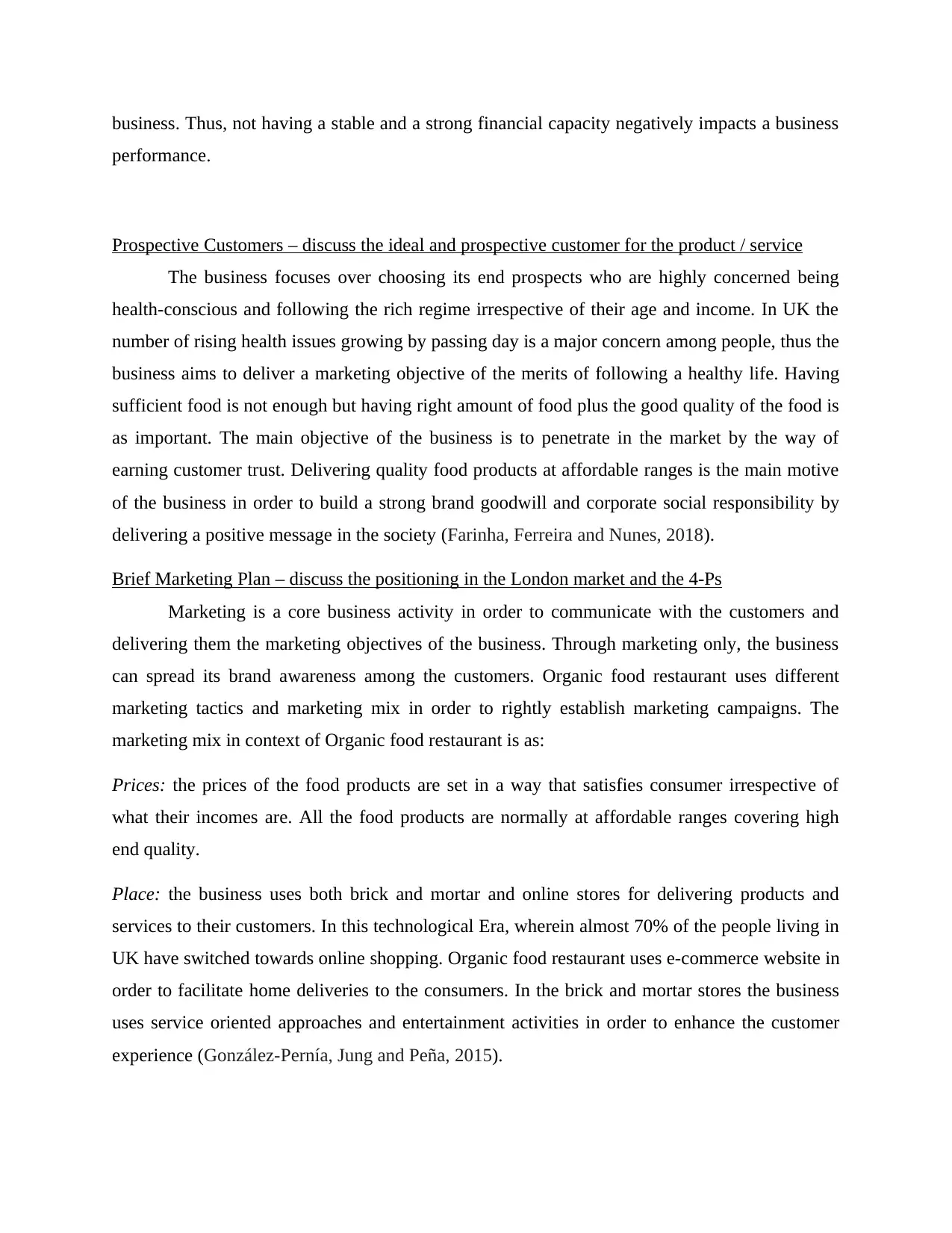
business. Thus, not having a stable and a strong financial capacity negatively impacts a business
performance.
Prospective Customers – discuss the ideal and prospective customer for the product / service
The business focuses over choosing its end prospects who are highly concerned being
health-conscious and following the rich regime irrespective of their age and income. In UK the
number of rising health issues growing by passing day is a major concern among people, thus the
business aims to deliver a marketing objective of the merits of following a healthy life. Having
sufficient food is not enough but having right amount of food plus the good quality of the food is
as important. The main objective of the business is to penetrate in the market by the way of
earning customer trust. Delivering quality food products at affordable ranges is the main motive
of the business in order to build a strong brand goodwill and corporate social responsibility by
delivering a positive message in the society (Farinha, Ferreira and Nunes, 2018).
Brief Marketing Plan – discuss the positioning in the London market and the 4-Ps
Marketing is a core business activity in order to communicate with the customers and
delivering them the marketing objectives of the business. Through marketing only, the business
can spread its brand awareness among the customers. Organic food restaurant uses different
marketing tactics and marketing mix in order to rightly establish marketing campaigns. The
marketing mix in context of Organic food restaurant is as:
Prices: the prices of the food products are set in a way that satisfies consumer irrespective of
what their incomes are. All the food products are normally at affordable ranges covering high
end quality.
Place: the business uses both brick and mortar and online stores for delivering products and
services to their customers. In this technological Era, wherein almost 70% of the people living in
UK have switched towards online shopping. Organic food restaurant uses e-commerce website in
order to facilitate home deliveries to the consumers. In the brick and mortar stores the business
uses service oriented approaches and entertainment activities in order to enhance the customer
experience (González-Pernía, Jung and Peña, 2015).
performance.
Prospective Customers – discuss the ideal and prospective customer for the product / service
The business focuses over choosing its end prospects who are highly concerned being
health-conscious and following the rich regime irrespective of their age and income. In UK the
number of rising health issues growing by passing day is a major concern among people, thus the
business aims to deliver a marketing objective of the merits of following a healthy life. Having
sufficient food is not enough but having right amount of food plus the good quality of the food is
as important. The main objective of the business is to penetrate in the market by the way of
earning customer trust. Delivering quality food products at affordable ranges is the main motive
of the business in order to build a strong brand goodwill and corporate social responsibility by
delivering a positive message in the society (Farinha, Ferreira and Nunes, 2018).
Brief Marketing Plan – discuss the positioning in the London market and the 4-Ps
Marketing is a core business activity in order to communicate with the customers and
delivering them the marketing objectives of the business. Through marketing only, the business
can spread its brand awareness among the customers. Organic food restaurant uses different
marketing tactics and marketing mix in order to rightly establish marketing campaigns. The
marketing mix in context of Organic food restaurant is as:
Prices: the prices of the food products are set in a way that satisfies consumer irrespective of
what their incomes are. All the food products are normally at affordable ranges covering high
end quality.
Place: the business uses both brick and mortar and online stores for delivering products and
services to their customers. In this technological Era, wherein almost 70% of the people living in
UK have switched towards online shopping. Organic food restaurant uses e-commerce website in
order to facilitate home deliveries to the consumers. In the brick and mortar stores the business
uses service oriented approaches and entertainment activities in order to enhance the customer
experience (González-Pernía, Jung and Peña, 2015).
⊘ This is a preview!⊘
Do you want full access?
Subscribe today to unlock all pages.

Trusted by 1+ million students worldwide
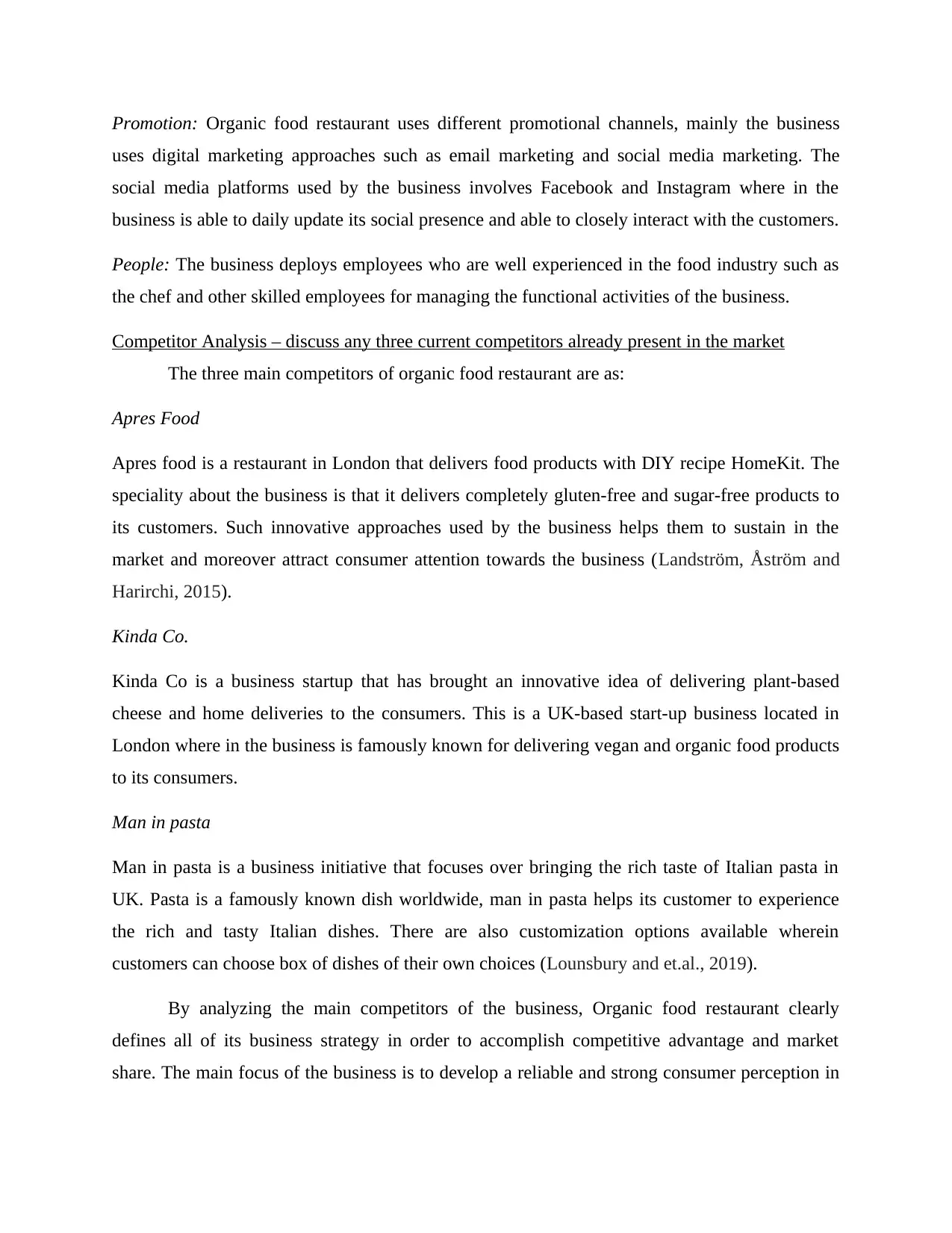
Promotion: Organic food restaurant uses different promotional channels, mainly the business
uses digital marketing approaches such as email marketing and social media marketing. The
social media platforms used by the business involves Facebook and Instagram where in the
business is able to daily update its social presence and able to closely interact with the customers.
People: The business deploys employees who are well experienced in the food industry such as
the chef and other skilled employees for managing the functional activities of the business.
Competitor Analysis – discuss any three current competitors already present in the market
The three main competitors of organic food restaurant are as:
Apres Food
Apres food is a restaurant in London that delivers food products with DIY recipe HomeKit. The
speciality about the business is that it delivers completely gluten-free and sugar-free products to
its customers. Such innovative approaches used by the business helps them to sustain in the
market and moreover attract consumer attention towards the business (Landström, Åström and
Harirchi, 2015).
Kinda Co.
Kinda Co is a business startup that has brought an innovative idea of delivering plant-based
cheese and home deliveries to the consumers. This is a UK-based start-up business located in
London where in the business is famously known for delivering vegan and organic food products
to its consumers.
Man in pasta
Man in pasta is a business initiative that focuses over bringing the rich taste of Italian pasta in
UK. Pasta is a famously known dish worldwide, man in pasta helps its customer to experience
the rich and tasty Italian dishes. There are also customization options available wherein
customers can choose box of dishes of their own choices (Lounsbury and et.al., 2019).
By analyzing the main competitors of the business, Organic food restaurant clearly
defines all of its business strategy in order to accomplish competitive advantage and market
share. The main focus of the business is to develop a reliable and strong consumer perception in
uses digital marketing approaches such as email marketing and social media marketing. The
social media platforms used by the business involves Facebook and Instagram where in the
business is able to daily update its social presence and able to closely interact with the customers.
People: The business deploys employees who are well experienced in the food industry such as
the chef and other skilled employees for managing the functional activities of the business.
Competitor Analysis – discuss any three current competitors already present in the market
The three main competitors of organic food restaurant are as:
Apres Food
Apres food is a restaurant in London that delivers food products with DIY recipe HomeKit. The
speciality about the business is that it delivers completely gluten-free and sugar-free products to
its customers. Such innovative approaches used by the business helps them to sustain in the
market and moreover attract consumer attention towards the business (Landström, Åström and
Harirchi, 2015).
Kinda Co.
Kinda Co is a business startup that has brought an innovative idea of delivering plant-based
cheese and home deliveries to the consumers. This is a UK-based start-up business located in
London where in the business is famously known for delivering vegan and organic food products
to its consumers.
Man in pasta
Man in pasta is a business initiative that focuses over bringing the rich taste of Italian pasta in
UK. Pasta is a famously known dish worldwide, man in pasta helps its customer to experience
the rich and tasty Italian dishes. There are also customization options available wherein
customers can choose box of dishes of their own choices (Lounsbury and et.al., 2019).
By analyzing the main competitors of the business, Organic food restaurant clearly
defines all of its business strategy in order to accomplish competitive advantage and market
share. The main focus of the business is to develop a reliable and strong consumer perception in
Paraphrase This Document
Need a fresh take? Get an instant paraphrase of this document with our AI Paraphraser
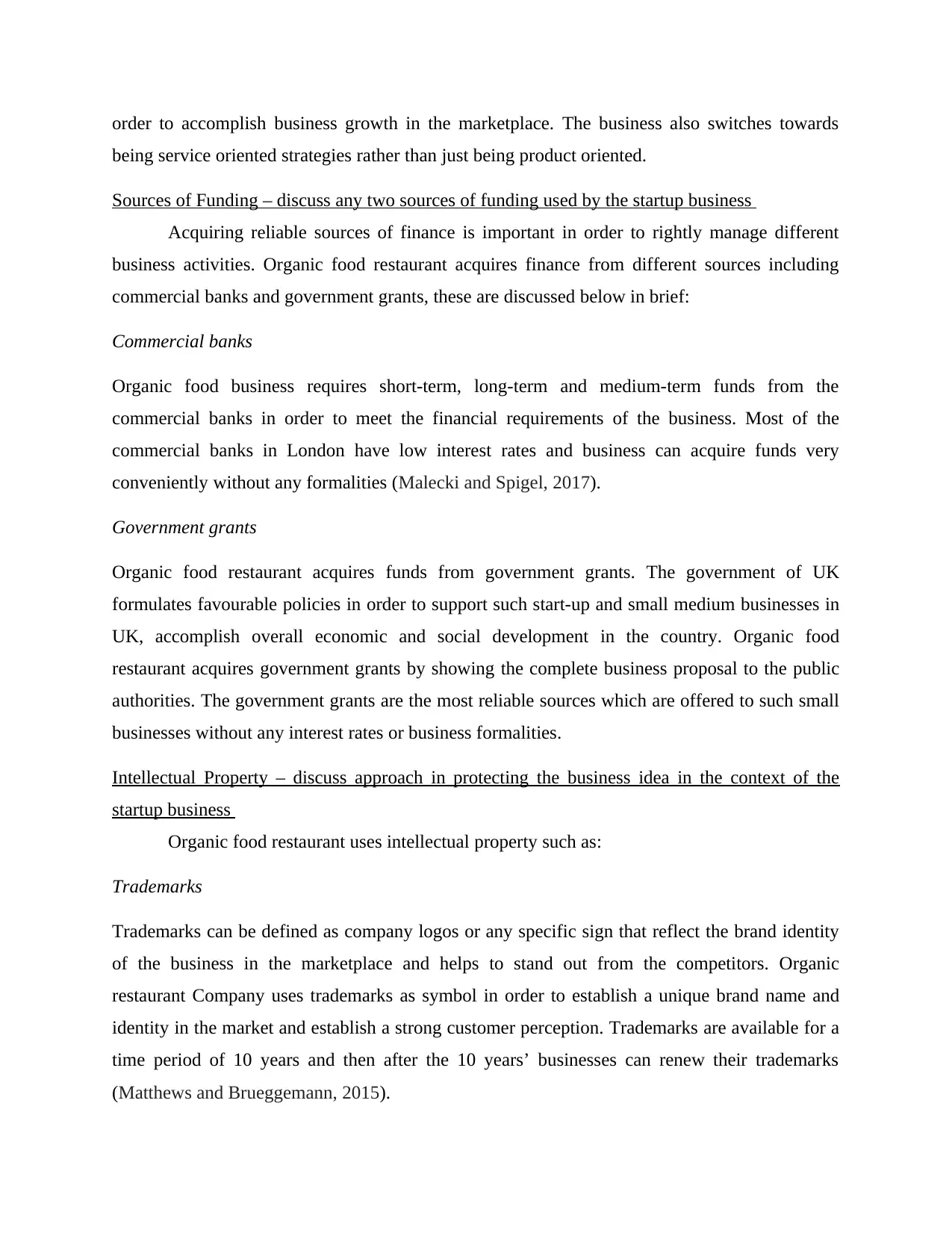
order to accomplish business growth in the marketplace. The business also switches towards
being service oriented strategies rather than just being product oriented.
Sources of Funding – discuss any two sources of funding used by the startup business
Acquiring reliable sources of finance is important in order to rightly manage different
business activities. Organic food restaurant acquires finance from different sources including
commercial banks and government grants, these are discussed below in brief:
Commercial banks
Organic food business requires short-term, long-term and medium-term funds from the
commercial banks in order to meet the financial requirements of the business. Most of the
commercial banks in London have low interest rates and business can acquire funds very
conveniently without any formalities (Malecki and Spigel, 2017).
Government grants
Organic food restaurant acquires funds from government grants. The government of UK
formulates favourable policies in order to support such start-up and small medium businesses in
UK, accomplish overall economic and social development in the country. Organic food
restaurant acquires government grants by showing the complete business proposal to the public
authorities. The government grants are the most reliable sources which are offered to such small
businesses without any interest rates or business formalities.
Intellectual Property – discuss approach in protecting the business idea in the context of the
startup business
Organic food restaurant uses intellectual property such as:
Trademarks
Trademarks can be defined as company logos or any specific sign that reflect the brand identity
of the business in the marketplace and helps to stand out from the competitors. Organic
restaurant Company uses trademarks as symbol in order to establish a unique brand name and
identity in the market and establish a strong customer perception. Trademarks are available for a
time period of 10 years and then after the 10 years’ businesses can renew their trademarks
(Matthews and Brueggemann, 2015).
being service oriented strategies rather than just being product oriented.
Sources of Funding – discuss any two sources of funding used by the startup business
Acquiring reliable sources of finance is important in order to rightly manage different
business activities. Organic food restaurant acquires finance from different sources including
commercial banks and government grants, these are discussed below in brief:
Commercial banks
Organic food business requires short-term, long-term and medium-term funds from the
commercial banks in order to meet the financial requirements of the business. Most of the
commercial banks in London have low interest rates and business can acquire funds very
conveniently without any formalities (Malecki and Spigel, 2017).
Government grants
Organic food restaurant acquires funds from government grants. The government of UK
formulates favourable policies in order to support such start-up and small medium businesses in
UK, accomplish overall economic and social development in the country. Organic food
restaurant acquires government grants by showing the complete business proposal to the public
authorities. The government grants are the most reliable sources which are offered to such small
businesses without any interest rates or business formalities.
Intellectual Property – discuss approach in protecting the business idea in the context of the
startup business
Organic food restaurant uses intellectual property such as:
Trademarks
Trademarks can be defined as company logos or any specific sign that reflect the brand identity
of the business in the marketplace and helps to stand out from the competitors. Organic
restaurant Company uses trademarks as symbol in order to establish a unique brand name and
identity in the market and establish a strong customer perception. Trademarks are available for a
time period of 10 years and then after the 10 years’ businesses can renew their trademarks
(Matthews and Brueggemann, 2015).
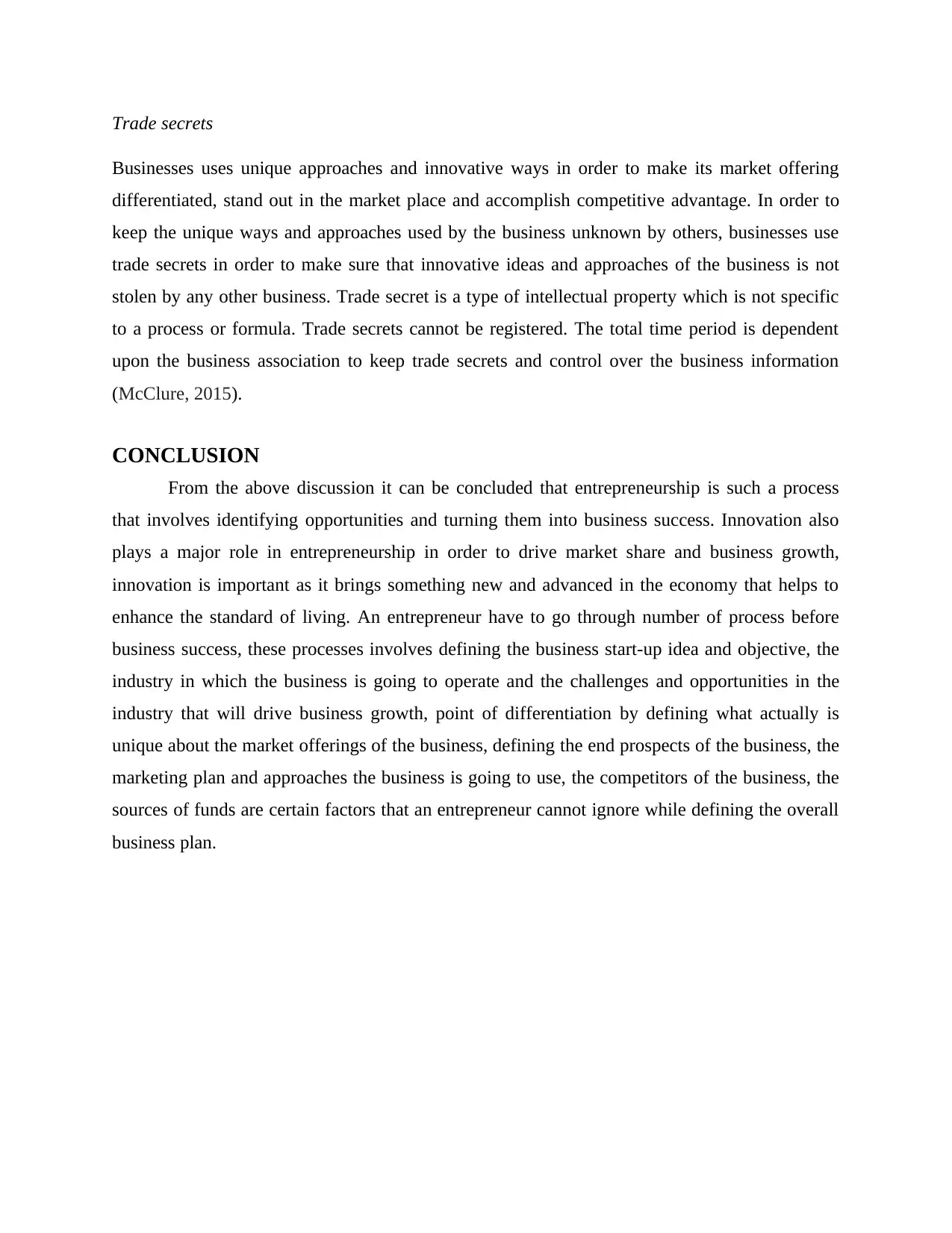
Trade secrets
Businesses uses unique approaches and innovative ways in order to make its market offering
differentiated, stand out in the market place and accomplish competitive advantage. In order to
keep the unique ways and approaches used by the business unknown by others, businesses use
trade secrets in order to make sure that innovative ideas and approaches of the business is not
stolen by any other business. Trade secret is a type of intellectual property which is not specific
to a process or formula. Trade secrets cannot be registered. The total time period is dependent
upon the business association to keep trade secrets and control over the business information
(McClure, 2015).
CONCLUSION
From the above discussion it can be concluded that entrepreneurship is such a process
that involves identifying opportunities and turning them into business success. Innovation also
plays a major role in entrepreneurship in order to drive market share and business growth,
innovation is important as it brings something new and advanced in the economy that helps to
enhance the standard of living. An entrepreneur have to go through number of process before
business success, these processes involves defining the business start-up idea and objective, the
industry in which the business is going to operate and the challenges and opportunities in the
industry that will drive business growth, point of differentiation by defining what actually is
unique about the market offerings of the business, defining the end prospects of the business, the
marketing plan and approaches the business is going to use, the competitors of the business, the
sources of funds are certain factors that an entrepreneur cannot ignore while defining the overall
business plan.
Businesses uses unique approaches and innovative ways in order to make its market offering
differentiated, stand out in the market place and accomplish competitive advantage. In order to
keep the unique ways and approaches used by the business unknown by others, businesses use
trade secrets in order to make sure that innovative ideas and approaches of the business is not
stolen by any other business. Trade secret is a type of intellectual property which is not specific
to a process or formula. Trade secrets cannot be registered. The total time period is dependent
upon the business association to keep trade secrets and control over the business information
(McClure, 2015).
CONCLUSION
From the above discussion it can be concluded that entrepreneurship is such a process
that involves identifying opportunities and turning them into business success. Innovation also
plays a major role in entrepreneurship in order to drive market share and business growth,
innovation is important as it brings something new and advanced in the economy that helps to
enhance the standard of living. An entrepreneur have to go through number of process before
business success, these processes involves defining the business start-up idea and objective, the
industry in which the business is going to operate and the challenges and opportunities in the
industry that will drive business growth, point of differentiation by defining what actually is
unique about the market offerings of the business, defining the end prospects of the business, the
marketing plan and approaches the business is going to use, the competitors of the business, the
sources of funds are certain factors that an entrepreneur cannot ignore while defining the overall
business plan.
⊘ This is a preview!⊘
Do you want full access?
Subscribe today to unlock all pages.

Trusted by 1+ million students worldwide
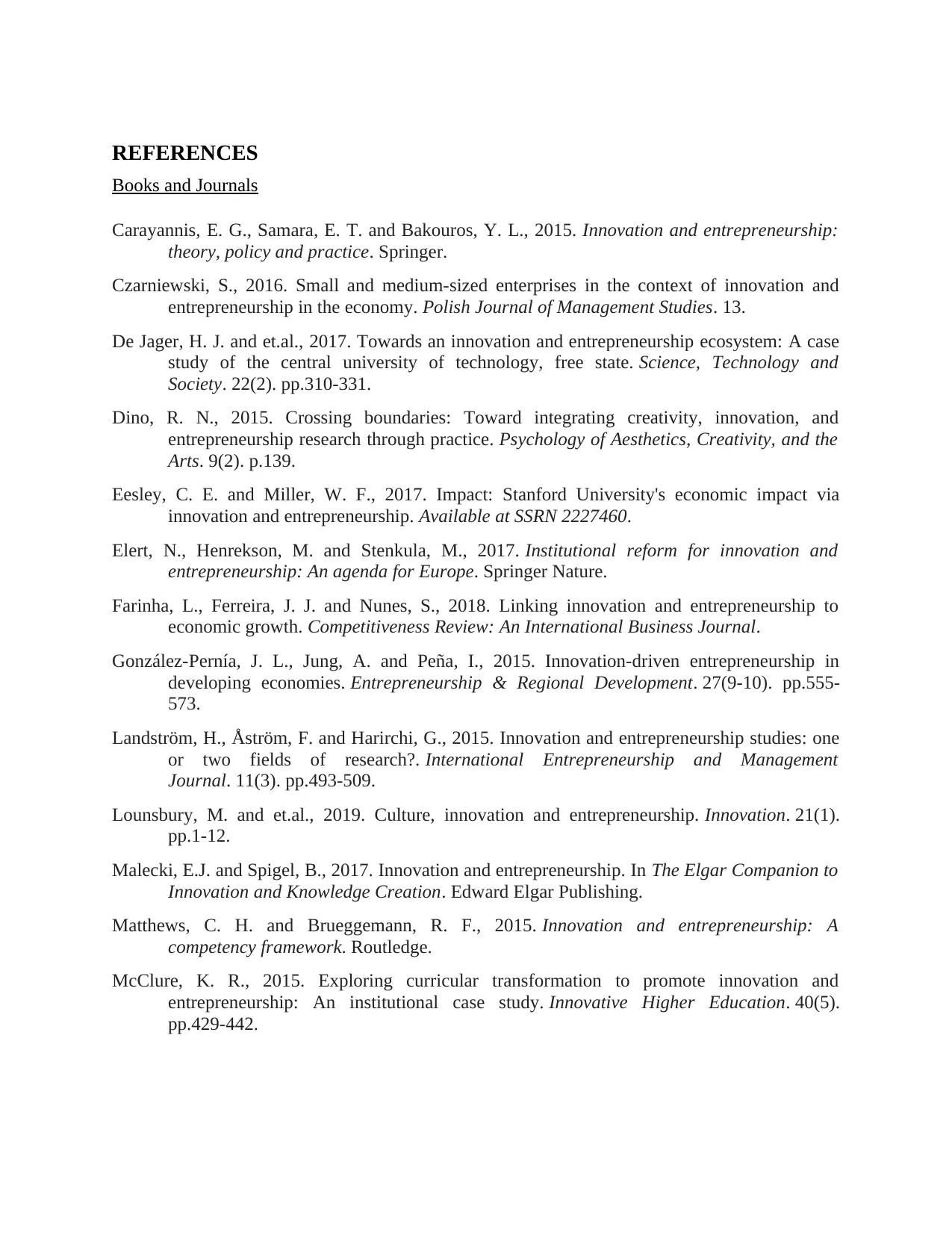
REFERENCES
Books and Journals
Carayannis, E. G., Samara, E. T. and Bakouros, Y. L., 2015. Innovation and entrepreneurship:
theory, policy and practice. Springer.
Czarniewski, S., 2016. Small and medium-sized enterprises in the context of innovation and
entrepreneurship in the economy. Polish Journal of Management Studies. 13.
De Jager, H. J. and et.al., 2017. Towards an innovation and entrepreneurship ecosystem: A case
study of the central university of technology, free state. Science, Technology and
Society. 22(2). pp.310-331.
Dino, R. N., 2015. Crossing boundaries: Toward integrating creativity, innovation, and
entrepreneurship research through practice. Psychology of Aesthetics, Creativity, and the
Arts. 9(2). p.139.
Eesley, C. E. and Miller, W. F., 2017. Impact: Stanford University's economic impact via
innovation and entrepreneurship. Available at SSRN 2227460.
Elert, N., Henrekson, M. and Stenkula, M., 2017. Institutional reform for innovation and
entrepreneurship: An agenda for Europe. Springer Nature.
Farinha, L., Ferreira, J. J. and Nunes, S., 2018. Linking innovation and entrepreneurship to
economic growth. Competitiveness Review: An International Business Journal.
González-Pernía, J. L., Jung, A. and Peña, I., 2015. Innovation-driven entrepreneurship in
developing economies. Entrepreneurship & Regional Development. 27(9-10). pp.555-
573.
Landström, H., Åström, F. and Harirchi, G., 2015. Innovation and entrepreneurship studies: one
or two fields of research?. International Entrepreneurship and Management
Journal. 11(3). pp.493-509.
Lounsbury, M. and et.al., 2019. Culture, innovation and entrepreneurship. Innovation. 21(1).
pp.1-12.
Malecki, E.J. and Spigel, B., 2017. Innovation and entrepreneurship. In The Elgar Companion to
Innovation and Knowledge Creation. Edward Elgar Publishing.
Matthews, C. H. and Brueggemann, R. F., 2015. Innovation and entrepreneurship: A
competency framework. Routledge.
McClure, K. R., 2015. Exploring curricular transformation to promote innovation and
entrepreneurship: An institutional case study. Innovative Higher Education. 40(5).
pp.429-442.
Books and Journals
Carayannis, E. G., Samara, E. T. and Bakouros, Y. L., 2015. Innovation and entrepreneurship:
theory, policy and practice. Springer.
Czarniewski, S., 2016. Small and medium-sized enterprises in the context of innovation and
entrepreneurship in the economy. Polish Journal of Management Studies. 13.
De Jager, H. J. and et.al., 2017. Towards an innovation and entrepreneurship ecosystem: A case
study of the central university of technology, free state. Science, Technology and
Society. 22(2). pp.310-331.
Dino, R. N., 2015. Crossing boundaries: Toward integrating creativity, innovation, and
entrepreneurship research through practice. Psychology of Aesthetics, Creativity, and the
Arts. 9(2). p.139.
Eesley, C. E. and Miller, W. F., 2017. Impact: Stanford University's economic impact via
innovation and entrepreneurship. Available at SSRN 2227460.
Elert, N., Henrekson, M. and Stenkula, M., 2017. Institutional reform for innovation and
entrepreneurship: An agenda for Europe. Springer Nature.
Farinha, L., Ferreira, J. J. and Nunes, S., 2018. Linking innovation and entrepreneurship to
economic growth. Competitiveness Review: An International Business Journal.
González-Pernía, J. L., Jung, A. and Peña, I., 2015. Innovation-driven entrepreneurship in
developing economies. Entrepreneurship & Regional Development. 27(9-10). pp.555-
573.
Landström, H., Åström, F. and Harirchi, G., 2015. Innovation and entrepreneurship studies: one
or two fields of research?. International Entrepreneurship and Management
Journal. 11(3). pp.493-509.
Lounsbury, M. and et.al., 2019. Culture, innovation and entrepreneurship. Innovation. 21(1).
pp.1-12.
Malecki, E.J. and Spigel, B., 2017. Innovation and entrepreneurship. In The Elgar Companion to
Innovation and Knowledge Creation. Edward Elgar Publishing.
Matthews, C. H. and Brueggemann, R. F., 2015. Innovation and entrepreneurship: A
competency framework. Routledge.
McClure, K. R., 2015. Exploring curricular transformation to promote innovation and
entrepreneurship: An institutional case study. Innovative Higher Education. 40(5).
pp.429-442.
1 out of 10
Related Documents
Your All-in-One AI-Powered Toolkit for Academic Success.
+13062052269
info@desklib.com
Available 24*7 on WhatsApp / Email
![[object Object]](/_next/static/media/star-bottom.7253800d.svg)
Unlock your academic potential
Copyright © 2020–2026 A2Z Services. All Rights Reserved. Developed and managed by ZUCOL.



